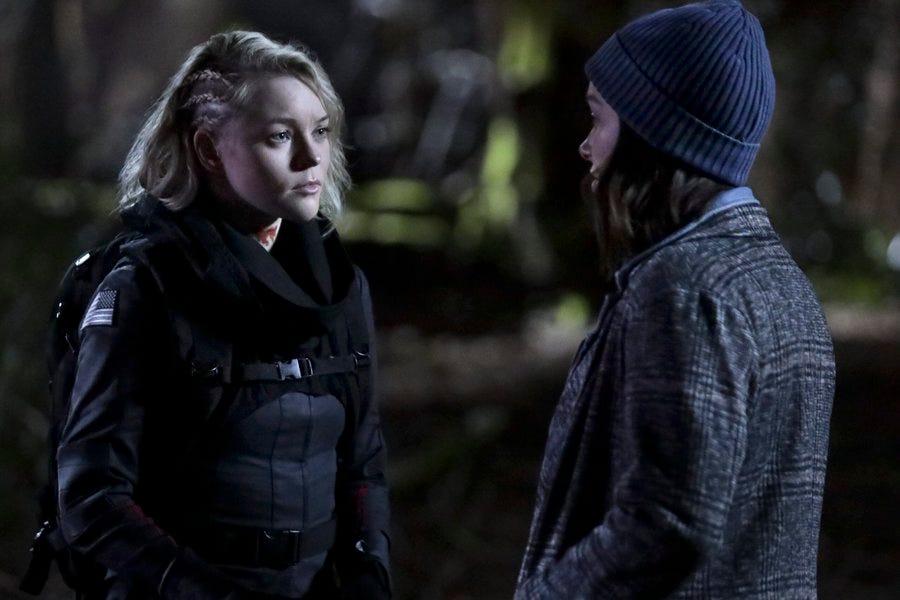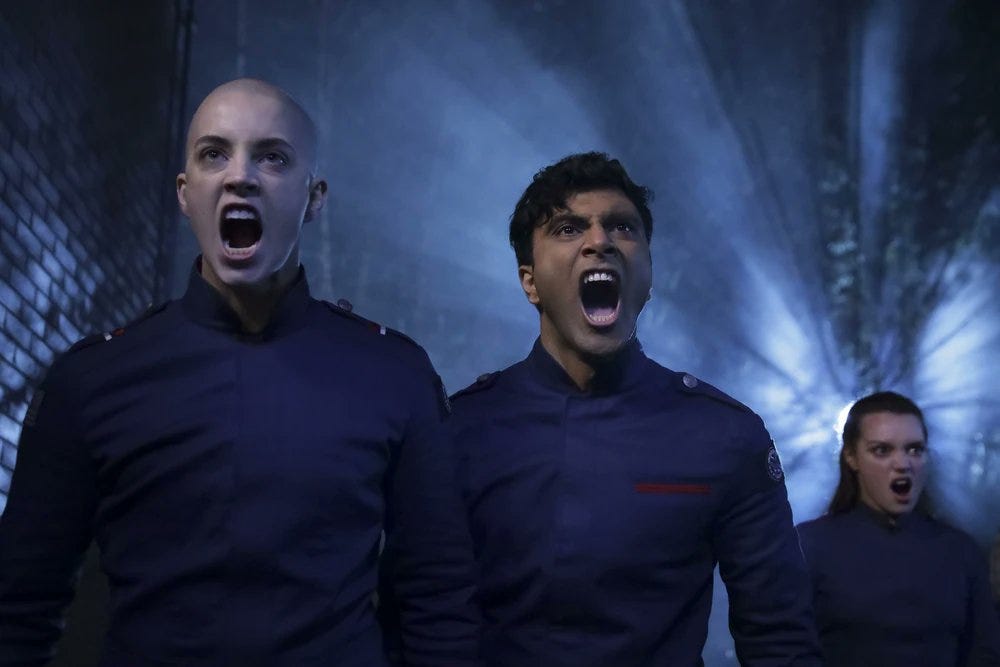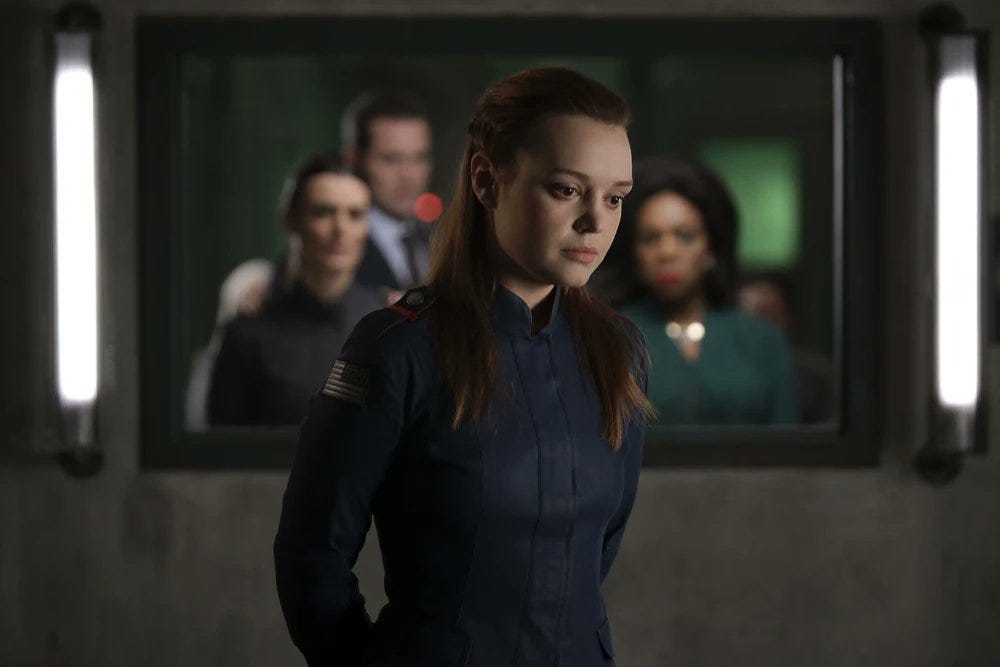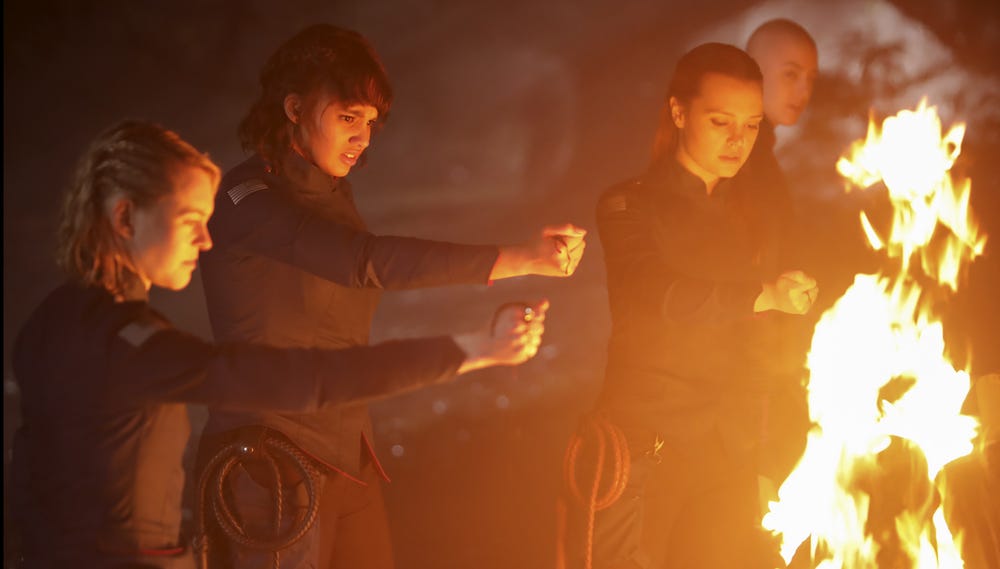motherland: fort salem
TV, 2020
Creator: Eliot Laurence
First Run: 2020-2022 (3 Seasons) - (Spoiler alert for the whole series)
Fantasy TV usually has to get two things right to succeed. First, fans must believe in the world that's been built. Second, fans must fall in love with the characters within it. For all its faults later in its run, the creators of MFS got those two things spectacularly right.
MFS has a passionate fan base for good reason. It has a beloved canonical queer couple, a compelling non-canon queer ship, plus an ensemble cast of women playing characters with authority, strength, purpose and power. It boasts a distinct, cinematic aesthetic that influences costumes, sets, lighting and cinematography. It also boasts a rich, (mostly) internally consistent, complex fantasy world.
Imagine the Salem witch trials ended in a truce, but in exchange witches must use their powers to defend the country, leading to a system of compulsory military conscription which is embraced by some, tolerated by many, and deeply resented by others. Power structures and bloodlines evolve, and witch society is now in a fractured state of haves and have nots, with outcasts and rebels choosing to either run or fight back.
MFS is wildly ambitious, with big, high-concept stories to tell, but MFS was too niche to attract a huge audience. It screened on an America-only network, was unabashedly queer, had morally-complex scifi themes, intricate plots, and a limited marketing budget. That doesn’t scream mainstream. But what it doesn’t lack is vision.
Those big dreams caused it to occasionally derail. Considering this ran from 2020 to 2022 it’s kind of amazing it got made at all. With more episodes, no pandemic, and less bad luck like the accident that saw breakout star Taylor Hickson forced to miss half of season three (she's fine, thankfully), they could have taken more care with the unravelling of all the complex plot points. The last three episodes try to tell more story than most shows try to tell in entire seasons, and MFS felt awkward and rushed towards its conclusion as a result.
There is no doubt though that late season one, all season two, and the first two episodes (and other parts) of season three are near-flawless fantasy television. Hard core fans adore the beginning of season one as well, as this period is heavy on worldbuilding and romance, but the show was still finding its feet. It’s a technical masterpiece, gorgeously shot, and rewards repeat viewing.
Our three MFS heroines, Tally Craven (Jessica Sutton), Abigail Bellweather (Ashley Nicole Williams) and Raelle Collar (Taylor Hickson), all have different, conflicting reasons for being in the army. They are thrown together as a Unit for basic training and soon realise they have a unique bond and complementary powers.
Outside the army, dodgers run from the draft, while terrorist organisation The Spree kills civilians to make a political point against conscription. The scene is set early for witch-on-witch turmoil, but eventually they realise that witches need to stop fighting each other in order to face a bigger enemy hell-bent on their destruction.
The matriarchal world of MFS puts women in the seats of power. It also disregards heterocentrist norms. There's witch and civilian, there’s definitely male and female (which causes non-binary issues unexpectedly addressed in season three), but there's no gay and straight.
These women celebrate sex with whomever they wish to have it. Sexual energy is a power source, and their sex lives are a natural, essential part of existence, like sleeping and breathing. The writers give sex and romance a lot of air time - all perfectly M-rated - and the show is all the better for it.
What MFS did very well was establish emotional bonds between characters. The fiery, unit relationship of Raelle, Tally and Abigail is addictive. Their drill sergeant Anacostia Quartermain (Demetria McKinney) is a strong presence, and her unexpected bond with terrorist Scylla Ramshorn resonates. General Sarah Alder is a beast of a role and Lyne Renée owns the bombastic side of her, but her greatest moments are the quieter ones she shares with Tally and Anacostia.
The canonical couple is Raelle and Scylla. Hickson is note perfect for Raelle - she’s scrappy, disrepectful, and tormented. Amalia Holm gives Scylla her bad girl rage and darkness but also her playfulness and humour (and amazing eye colour). Together they’re angsty, flawed, and share off-the-charts chemistry. There is a startling level of queer representation, something only matched in fantasy TV by Wynnona Earp and Lost Girl (bless these brilliant Canadians), plus potentially Warrior Nun, and Willow.
MFS has something perhaps only Lost Girl shares with it - in your face sexuality, with women taking and controlling their own power. Hickson and Holm portrayed a multi-faceted, complicated, unequivocally sexually-charged relationship from the pilot to the finale. There’s no ambiguity, no queerbaiting, and their love was interwoven into all major plotlines. They have rich, in your face intimacy, both physical and emotional. This is not normal, and it’s so much fun.
Ironically, in season three Scylla laments to Raelle she wishes they had more time. Considering when it’s said, I think the MFS writers inserted it in protest. Characters literally move mountains, get tortured, travel vast distances, are redeemed, fight battles, and escape sticky situations in off-camera asides that are told to us to basically move the story along. We don’t see it. The same story stretched across another season (or two) would have been captivating.
Still, this all-inclusive, feminist fantasy world with a queer vision is riotously entertaining, sometimes violent, and shamelessly romantic.
PS - Taylor Hickson redeemed the entire concept of lesbians kissing each other’s fingertips. I’m not even sure she knew it was a tired trope before she busted it, but she made it her love language. I’m either going to have to rename this site, or dedicate it to her!
Motherland Fort Salem Photo Gallery
Redemption by Flora Leo (feat. Amalia Holm)









I love your review. Straight and right to all the points of MFS. One thing, I didn't know about the trope of "kissing fingertips". Now I'll remember this for all times when I rewatch MFS and see Raelle kissing Scyllas fingertips ...